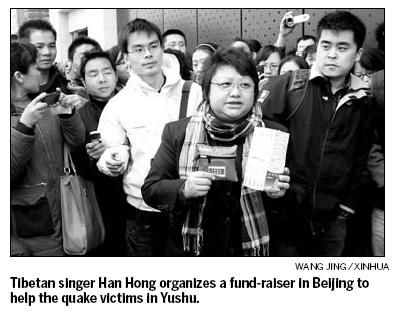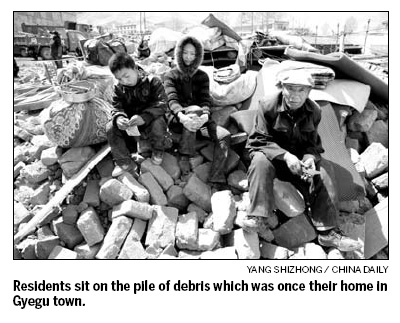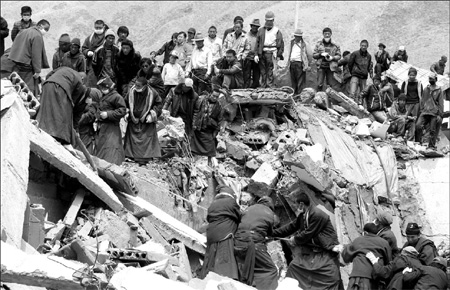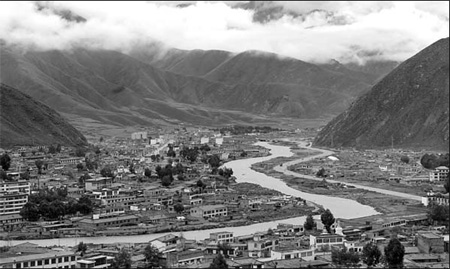Picking up the pieces
|
Lamas from Gyegu joining the rescuing effort to free residents trapped in the debris. Yang Shizhong / China Daily |
As official rescue efforts intensify in quake-hit Yushu, help is also pouring in from NGOs involved in conservation efforts. But above everything, the Tibetans are turning to their religion. Lin Shujuan reports
Anxiety, guilt, gratitude. Dawa Tsering, a 46-year-old native of quake-hit Yushu prefecture in Qinghai province, has experienced all this, besides a deep sadness, in the space of just two days.
On hearing that a 7.1-strong quake had jolted his hometown on Wednesday morning, Tsering, a researcher on Tibetan Buddhism in Beijing, rushed to call his parents.
The few minutes that it took to be answered felt like eternity, he says. Just as he began to imagine the worst, he heard his sister's voice at the other end of the line. The family was safe, she told him, but the house was on the brink of collapse.
That was why it had taken a while to answer the phone. They were too scared to venture back into the house.
Torn by guilt, Tsering says: "I should have called their mobile phones."
He then called his oldest brother, a taxi driver living in Jiegu, or Gyegu in Tibetan, the epicenter of the quake. His house, like 85 percent of the mud-and-wood homes in the area, had been flattened.
His sister-in-law had injured her leg but "it was nothing", she insisted. Many others had lost a leg, or worse.
"Don't worry," she continued, "but we have to cut short our conversation so we can help the others. Also, we don't know how long the battery (of the mobile phone) will last."
That taught Tsering another important lesson. No long conversation on the phone.
As he tried to reach other relatives and friends in the quake-hit area, he remembered to keep each conversation to under a minute.
He was glad to hear most had survived the quake and built temporary homes with tents.
"Even though we no longer lead nomadic lives, we Tibetans like the outdoors. Many of our homes have tents - not the kind that can protect you from extreme weather, but the kind you can take to a horse racing festival in summer," Tsering says.
He thought of going back to his hometown to volunteer help. But soon realized it was not a wise decision. While Yushu's elevation at about 4,000 meters above sea level, a major challenge facing the rescue team sent by the government, would not pose a problem, he had no experience in rescue operations. His hasty phone call was an example of this, he says.
For many Chinese, images from Yushu bring to mind the devastating May 2008 earthquake in Sichuan province that killed 80,000.
But one thing it has taught people is that sending supplies for rescue teams to carry is better than landing up in the disaster zone area with few skills in relief efforts.
Despite its remote location on the eastern part of the Tibetan plateau, a professional rescue team from Beijing arrived at the quake area within 12 hours, thanks to the opening of a new airport in Yushu last August. By the second day, survivors had been transported to major hospitals in Qinghai's capital Xining and neighboring Sichuan's capital, Chengdu.
Volunteers and donors have been trading information on Twitter and Tibetans along with Han Chinese living in Beijing organized a fund-raiser near the city's largest Tibetan Buddhist temple on Thursday afternoon.
Han Hong, a popular singer of Tibetan origin, initiated the drive, collecting 45,000 yuan ($6,600) within three hours. Han herself donated 300,000 yuan. Fund raising will continue throughout the weekend.
Non-governmental organizations, especially those active in Yushu, have also stepped in.
Over the past decades, Yushu, home to the source of three of China's major rivers - the Yellow River, the Yangtze River and the Lancang River - besides the renowned Hoh Xil Nature Reserve, has attracted a number of environmentalists concerned about the conservation of its unique and fragile ecology.
Thanks to their familiarity with the area and an extensive local network built over the years, they are now channeling their resources to build a lifeline for those in the badly-hit yet hard-to-reach areas.
"Large-scale rescue efforts by the government is understandably delayed in those areas," says Geng Dong, an official with the Shan Shui Conservation Center, an NGO dedicated to engaging local communities in conservation.
Shan Shui, for example, has formed its own rescue teams, Geng says. Some have taken charge of the fund raising, while others are looking after logistics and transport. Wang Dajun, a professor from Peking University who has been involved in protecting snow leopards in Yushu, has taken over the task of coordinating donor relief supplies.
However, above everything, Tsering believes the Tibetan survivors need the comfort of their religion.
"Prayers and blessings from a lama incarnate, or living Buddha as they are called, are as essential as water, food and shelter for us Tibetans," he says.
"Religion will play an important part in the psychological healing process," he says. "And it shall start now. We Tibetans believe in karma but that does not mean that we are not afraid of death or we don't grieve over the loss of a relative."
Traditionally, Tibetan people hold a prayer ceremony for the dead before the burial. This is meant not only for the comfort of the departed soul but also for those left behind, Tsering says. "A ceremony for the dead from this unexpected and sudden earthquake is especially important."
The living Buddhas in Yushu, he adds, will offer prayer ceremonies as soon as conditions allow.
When he heard of the quake, Zhaxi, a 26-year-old Tibetan news editor with a major news portal in China, changed his messenger sign-on name to karmapa chenno, which literally means "embodiment of the compassion of all Buddhas, take heed of me".
"We believe in prayers," he says simply.


|
A picturesque Gyegu town in Yushu county before the earthquake. Liu Shuting / Asia News Photo |
(China Daily 04/17/2010 page11)
















